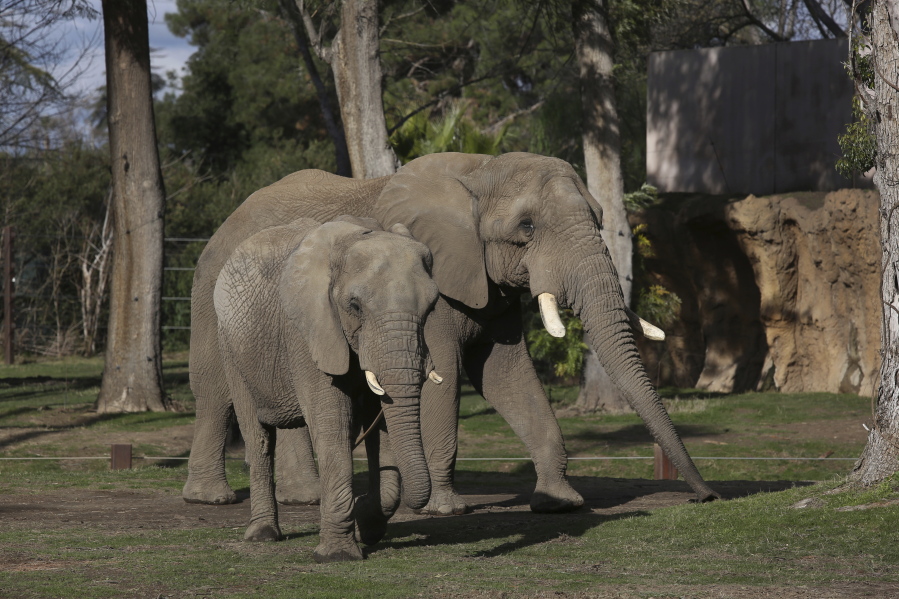FRESNO, Calif. — Mabu saunters across a grassy field and raises his long, gray trunk to wrangle food from a hole carved inside a large boulder, captivating the attention of a girl propped up on her father’s shoulders.
At this zoo in Central California, the 32-year-old African elephant is key not only to drawing visitors but also to ensuring there are elephants for zoogoers to see in the years to come — a future that some animal lovers want to avoid.
Over the past year, the Fresno Chaffee Zoo has been pulled into a growing global debate over the future of elephants in zoos. In recent years, some zoos have phased out elephant exhibits due to the complexity of the animals and their needs. Still, others — like Fresno’s zoo — say they are committed to keeping elephants and are turning to breeding, arguing that a sustainable population of zoo elephants will help spur a commitment to wildlife conservation among future generations of visitors.
The zoo in Fresno, while beloved by local residents, has been targeted by animal activists in a report criticizing living conditions for the elephants and in legal actions trying to free them. Broadly, some elephant experts say urban zoos simply don’t have the space that African elephants, who roam extensive distances in the wild to forage for hundreds of pounds of vegetation each day, need for a normal life.
The zoo opened a revamped and expanded multi-species African Adventure exhibit in 2015 to better accommodate elephants, lions and gazelles by giving them more space to roam. It’s also been working with other zoos around the country on breeding more of the animals, which are endangered in the wild, in the United States.
Mabu came to the zoo from one in Arizona last year after Vus’Musi, another male elephant, showed little interest in breeding. Mabu has sired offspring at other zoos, and there’s hope he can do so again to grow the Fresno zoo’s population.
“Lions, tigers and bears. People are coming to see charismatic megafauna — that’s the term we use,” said Jon Forrest Dohlin, chief executive officer of the Fresno Chaffee Zoo. He said visitors who see animals in real life — instead of in a photo or on a screen — are more likely to support conservation efforts.
In recent years, some larger zoos such as the Toronto Zoo and San Francisco Zoo have phased out their elephant programs, sending their aging animals to sanctuaries in the United States that have far more space.
In some cases, animal rights activists have started legal efforts aimed at removing elephants from zoos.
In New York, the Nonhuman Rights Project filed legal papers to try to free the Asian elephant Happy from the Bronx Zoo but lost in court. The group then filed similar papers to free Fresno’s three African elephants — a mother-daughter pair and Vus’Musi — but a judge ruled against the group.
Jake Davis, an attorney for the Nonhuman Rights Project, said the case isn’t over — especially since the zoo sent Vus’Musi to a zoo in San Diego so it could bring in Mabu in a bid to boost breeding.
“(Mabu) really is their golden ticket,” Davis said. “Hopefully we can get him out.”
Some elephant experts argue that the more humans learn about elephants’ intelligence and social networks, the more compelling the argument to release them — or at least to stop breeding them in zoos. They also note that poaching of elephants and habitat destruction in Africa continue despite conservation efforts by zoos and question the difference they’re making in hosting visitors who are largely seeking recreation.
“It’s wrong to be bringing more elephants into living 60 years, or whatever they live to, in a captive situation,” said Joyce Poole, co-founder of the advocacy group Elephant Voices, adding that in the wild, elephants make decisions about where to find food and water and meet with relatives, something they can’t do in zoos. “It’s like seeing a person in prison.”
Elephants were brought to U.S. zoos for decades, but transfers of African elephants have become rare in recent years amid rising international concern over the numerous threats they face in the wild — which also prompted the International Union for Conservation of Nature to change the species from vulnerable to endangered in 2021. The U.S. Fish and Wildlife Service is also drafting new rules for elephant imports aimed at protecting African elephants, which have dwindled from 26 million in the 18th century to 415,000.
The future of elephants — which have relatively few offspring and a 22-month gestation period — in zoos hinges largely on breeding. The Association of Zoos and Aquariums, which has a program aimed at sustaining the zoo population, said about 160 African elephants currently live in U.S. zoos.



